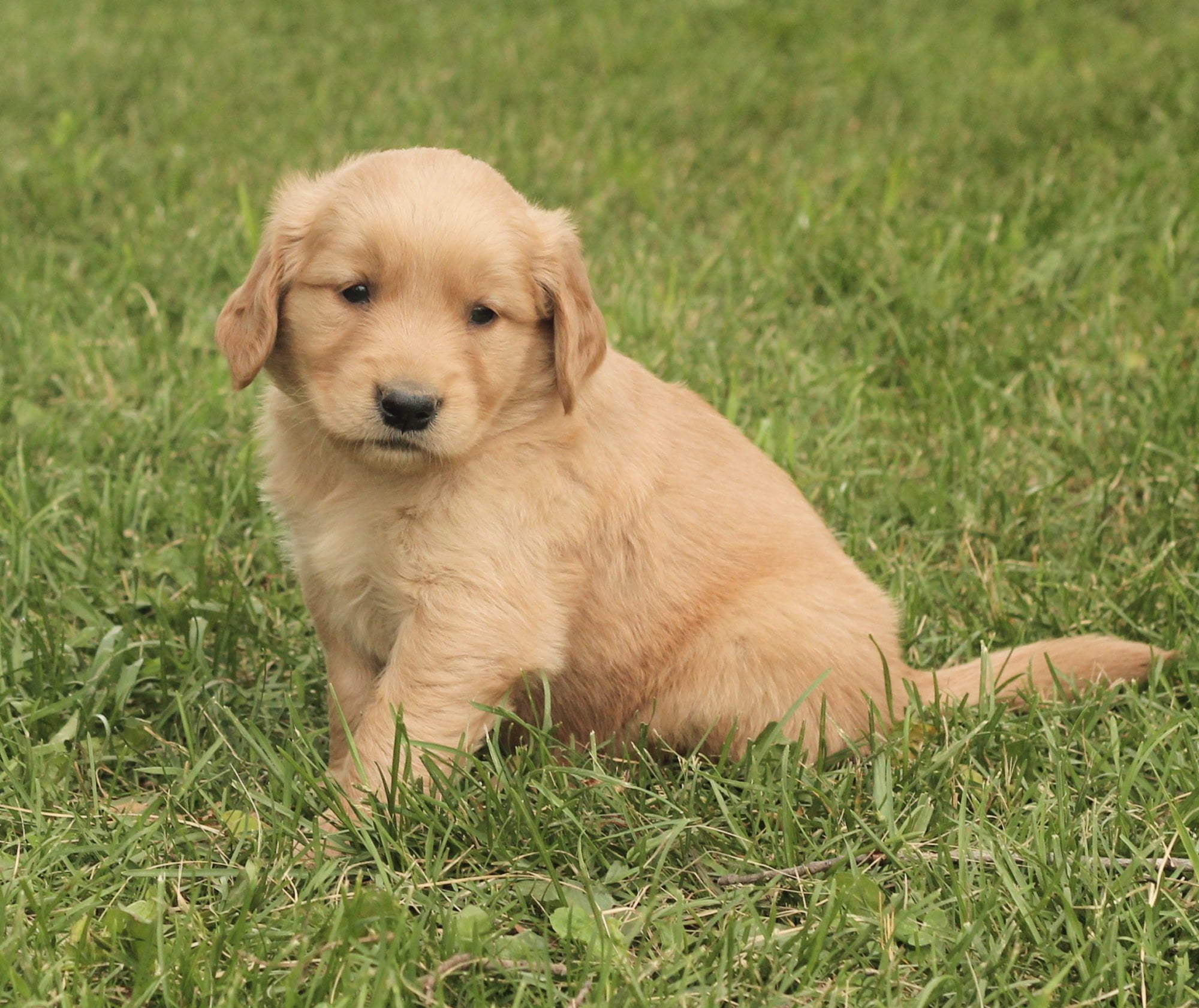Considering welcoming a Golden Retriever puppy into your home? You're about to embark on a journey filled with unconditional love, playful antics, and unwavering loyalty.
Golden Retrievers, with their friendly demeanor and stunning golden coats, have captured the hearts of people worldwide. These dogs are not just pets; they are integral members of the family, offering companionship, comfort, and countless moments of joy. But what does it truly take to understand and raise a Golden Retriever, from the delicate puppy phase to the golden years of their lives?
This breed's popularity stems not only from its beauty but also from its remarkable temperament. Golden Retrievers are known for their intelligence, trainability, and gentle nature, making them ideal companions for families, individuals, and even those with other pets. Their history, health considerations, grooming needs, training requirements, and the journey from puppyhood to adulthood are all essential aspects of responsible ownership. Moreover, finding a reputable breeder or considering adoption are critical steps in ensuring your new furry friend receives the best possible start in life. Understanding their growth milestones, socialization needs, and the potential challenges along the way will empower you to provide a happy, healthy life for your Golden Retriever.
| Aspect | Details |
|---|---|
| History | Developed in Scotland in the mid-19th century, bred to retrieve waterfowl. Crossed a yellow retriever with a tweed water spaniel to achieve it. |
| Characteristics | Medium to large size, muscular build, dense, water-repellent double coat, feathered legs and tail. |
| Temperament | Friendly, intelligent, eager to please, loyal, patient, and good with children and other pets. |
| Grooming | Regular brushing (several times a week) to prevent matting, especially during shedding seasons. Occasional baths. |
| Training | Highly trainable, responds well to positive reinforcement. Early socialization is crucial. |
| Health | Prone to certain health issues like hip dysplasia, elbow dysplasia, cancer, and eye problems. |
| Exercise Needs | Moderate to high. Daily walks, playtime, and mental stimulation are essential. |
| Average Lifespan | 10-12 years. |
| Cost | When purchased from a quality breeder, expect to pay about $1,000 to $3,500. Adoption is typically around $300. |
| Popularity | Consistently ranked among the most popular dog breeds in the United States and worldwide. |
For more information about the Golden Retriever breed, you can visit the American Kennel Club (AKC) website.
This guide will delve into the many facets of Golden Retriever ownership, helping you make informed decisions and provide the best possible care for your beloved companion. From the moment you bring your puppy home to the day you bid them farewell, your Golden Retriever promises a life filled with unforgettable memories.
From the "angel phase" of puppyhood to the "teenage rebellion" phase, training a Golden Retriever requires patience, consistency, and a deep understanding of their unique needs. Learning how to train a Golden Retriever puppy is a commitment that begins the moment your new friend arrives at your home.
The early weeks and months are crucial for socialization, where your puppy will learn to interact appropriately with people, other dogs, and various environments. Then theres house training, basic obedience commands, and the importance of providing consistent rules and boundaries. Positive reinforcement methods, such as praising and rewarding desired behaviors, are especially effective. Remember that every dog has their own personality and temperament. While Golden Retrievers are generally great with kids and babies, it's essential to observe your individual dog's behavior closely and address any issues as soon as possible.
As your puppy grows, you'll witness incredible milestones the loss of baby teeth, the cessation of nipping and biting, and the development of sleep patterns. You'll experience the joy of a puppy sleeping through the night for the first time, a sign of their growing maturity. This is also a period of significant physical and mental development. You'll be surprised by the rapid growth, the emergence of their unique personalities, and the bonds that strengthen every day. This period is a crucial time for socialization, and it is important to introduce your puppy to new experiences, sounds, people, and places in a controlled and positive manner to help them develop into well-adjusted adults.
Choosing a Golden Retriever puppy can be an exciting endeavor, but selecting the right breeder or opting for adoption is paramount. Finding a reputable breeder means finding someone who prioritizes the health and well-being of their dogs. Look for breeders who conduct health screenings, are knowledgeable about the breed, and are transparent about their practices. Alternatively, adopting a Golden Retriever from a shelter or rescue organization provides a loving home for a dog in need, providing a home can also be a rewarding and cost-effective option.
Caring for a baby Golden Retriever's coat is an essential aspect of their overall well-being. Regular brushing, especially during shedding seasons, helps to prevent tangles and matting, keeping their coat healthy and shiny. This isn't just about aesthetics; it's about ensuring the comfort of your puppy and preventing skin irritation.
Providing love, consistent training, a healthy diet, regular exercise, and plenty of socialization are the best ways to raise a happy Golden Retriever. They thrive on interaction and mental stimulation, and these elements combine to ensure your dog's well-being.
Golden Retrievers are often cited as being great with babies. By giving your Golden Retriever praise and positive reinforcement when they behave calmly and gently around the baby, you help reinforce that behavior. This will encourage a harmonious and loving relationship between your family members, both human and canine.
The Golden Retriever's history is one of careful breeding to create a dog with specific working abilities. The breed was developed in Scotland, the result of crossing a yellow retriever with a tweed water spaniel to achieve a perfect retrieval breed. Later, Irish Setter and Bloodhound were added to create a superior working retriever.
The exceptional retrievers we know today are perfect due to great discipline and gentle spirit, the very goal of this task is to bring the trophy back as undamaged as possible. They were designed to bring back waterfowl in excellent condition. The breed took off nationally in the 1970s when President Gerald Ford had a Golden Retriever at the White House named Liberty.
The cost of a Golden Retriever puppy varies depending on several factors, including the breeder's reputation, location, and the dog's pedigree. You can expect a Golden Retriever price to be about $1,000 to $3,500 when you purchase from a quality breeder. Adopting a Golden Retriever from a shelter or rescue is a much more affordable option, with the cost typically around $300 to cover the expenses of caring for the dog before adoption.
When looking for a Golden Retriever, you can browse by location, age, gender, and AKC champion bloodline status. The characteristics of Golden Retrievers are well-defined: a medium to large size, a muscular build, and a dense, water-repellent double coat that comes in varying shades of gold. They are known for their friendly, intelligent, and eager-to-please temperaments, making them excellent companions for families, individuals, and even those with other pets. They are also fiercely loyal to their families, which explains why there are countless stories of goldens protecting or rescuing their people from dangerous situations.
You can find Golden Retriever puppies from loving breeders, often advertised with the detail that the puppies are ready to go to a loving home immediately. There are also organizations that support rescues and shelters that have Golden Retrievers for adoption. Whether you choose to buy from a breeder or adopt, your Golden Retriever will become an integral part of your family.
Theres a reason the stereotypical dream life involves a family, a house, a white picket fence, and a Golden Retriever. They're on top of every "best dog breeds for families" list for a reason, too. Their gentle spirit and affectionate nature make them ideal companions for children, providing a safe and loving environment for the whole family. Golden Retrievers excel in social situations and generally thrive in homes with babies and children.
Golden retrievers are excellent with kids. It's essential to observe your individual dog's behavior closely and address any issues as soon as possible. Giving your Golden Retriever praise and positive reinforcement when they behave calmly and gently around the baby can reinforce this behavior.
Golden retrievers require regular brushing to prevent tangles and matting, especially during shedding seasons. They require a healthy diet, regular exercise, and plenty of socialization with people and other pets. They will take on responsibility, even when they are still very small.
Buddy the Golden Retriever from day one knew he was part of the family. Todd went on a hike with his owner, Paula, on a trail near Anthem, Arizona. Providing love, consistent training, a healthy diet, regular exercise, and plenty of socialization with people and other pets is the best way to raise a happy Golden Retriever.
The Golden Retriever's trainability is a significant advantage. They respond well to positive reinforcement methods, such as praise and rewards. Their eagerness to please and their intelligence make training sessions easier and more enjoyable. Their intelligence makes training easier and the consistency ensures that the learning is effective. Early socialization is crucial for helping them become well-adjusted adults. This is a time when your puppy needs to be introduced to new experiences, sounds, people, and places.
Golden Retrievers typically live between 10 and 12 years. During these years, they will experience many stages of life, from puppyhood to their golden years. Your puppy can have many experiences, so your training can be tailored to these stages.
When you buy from a quality breeder, you can expect to pay $1,000 to $3,500 for a Golden Retriever puppy. However, adopting a Golden Retriever from a shelter or rescue can be a much more affordable option, with costs often around $300. This cost covers the expenses of caring for the dog before adoption. Several organizations support rescues and shelters through the sale of Golden Retriever gifts.
Golden Retrievers are great with babies and can be trained well. Remember, every dog has its personality and temperament. The cost to adopt a Golden Retriever from a shelter or rescue is around $300 in order to cover the expenses of caring for the dog before adoption.


